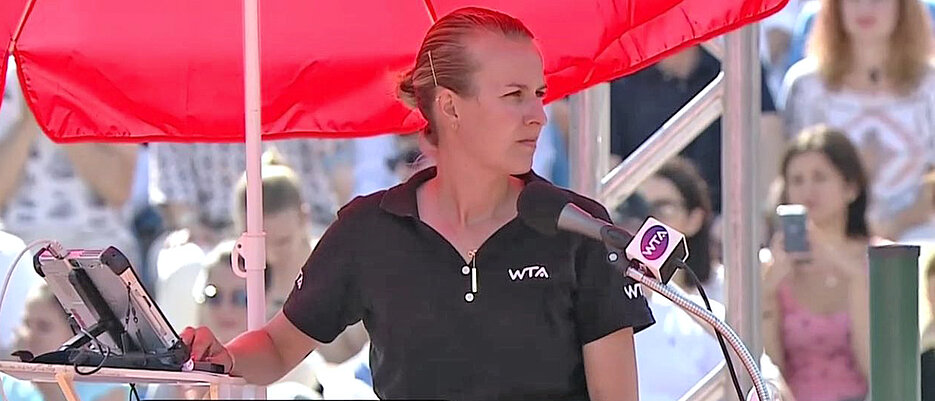From Würzburg into the world
06/30/2019Alumna Miriam Bley has made an unusual career choice: After completing the teachers training programme at university, she decided to work as a professional tennis umpire and travels from court to court today.

Which jobs do graduates from the University of Würzburg work in? To present different perspectives to students, Michaela Thiel, the director of the central alumni network, interviews selected alumni. This time, it's Miriam Bley's turn. After studying to be a teacher, she made an unusual career decision: She became a professional tennis umpire and today she sits in the high chair presiding over matches during all major tennis tournaments.
Ms Bley, how did you end up in such an exciting and unusual profession? It was more by chance that I became an umpire. When I trained for my level C district coaching qualification, chief umpire training in Lower Franconia was mandatory and this got me started on my career path. At first, I didn't have a clue what to expect and which opportunities would arise. But I was and continue to be surprised in a positive way: I met nice colleagues and tournament officials, made lots of new friends, visited plenty of interesting cities and countries, both in Germany and abroad, and learned to master new challenges.
What do you like most about your job? The actual work sitting in the umpire chair is quite entertaining, but apart from that my job also enables me to push my limits and handle stressful situations. Moreover, you have to be able to respond quickly and communicate well. I also love watching tennis and as an umpire I have the best place in the court.
And what do you like less about umpiring? Since I travel a lot, I am rarely at home and don't see my family very often. So I thoroughly enjoy every second I spend at home. You learn to appreciate being at home much more.
You fly a lot and travel all around the world. How do you manage to be fit for the tournaments? As long as you are travelling "just" in Europe, frequent flying is not a problem, but outside of Europe I sometimes have problems with jet lag. But you learn some tricks how to better cope with this over time.
How strenuous is your job in the umpire chair? Especially during outdoor tournaments, I am often exposed to the elements. This may not sound like a big challenge, but in fact it is. If you sit outside for several hours a week at temperatures below 10 degrees Celsius wearing four layers of clothing and afterwards face the other extreme at a scorching 35 degrees, you just fall into bed knackered in the evening. Apart from that, our days are quite long, especially early in the week when the schedule is full, and they are even longer during indoor tournaments where the number of courts is limited. Then I sometimes spend ten to fourteen hours on the court which is also exhausting.
Which traits are important in your job? Good eyesight is of course crucial but you also need to be flexible. Sometimes assignments change on short notice and you get sent to a different country than planned or you have to help out on short notice if an umpire has a longer match. Of course, you also have to be able to get along with a group of different characters which is not always easy.
Is it more difficult for women to get established in your field of work? Today, women are increasingly promoted, especially by the Women’s Tennis Association, but also the International Tennis Federation has got on board. However, some male players still have a problem with a female umpire, but they have to bite the bullet and play. The German Association of Tennis Umpires and the Bavarian Tennis Association are always looking for new talent.
And lastly: What are your best memories of studying in Würzburg? There are plenty. Studying sports, there was always a lot going on. I fondly remember the skiing courses and less so the ice skating course which was absolutely not my thing. In English philology, I was always most interested in reading and analysing literature. Reading, whether in English or German, is still one of my favourite pastimes.
Thank you for the interview.
If you want to learn more about the alumni network of the University of Würzburg or to register, follow the link below.






